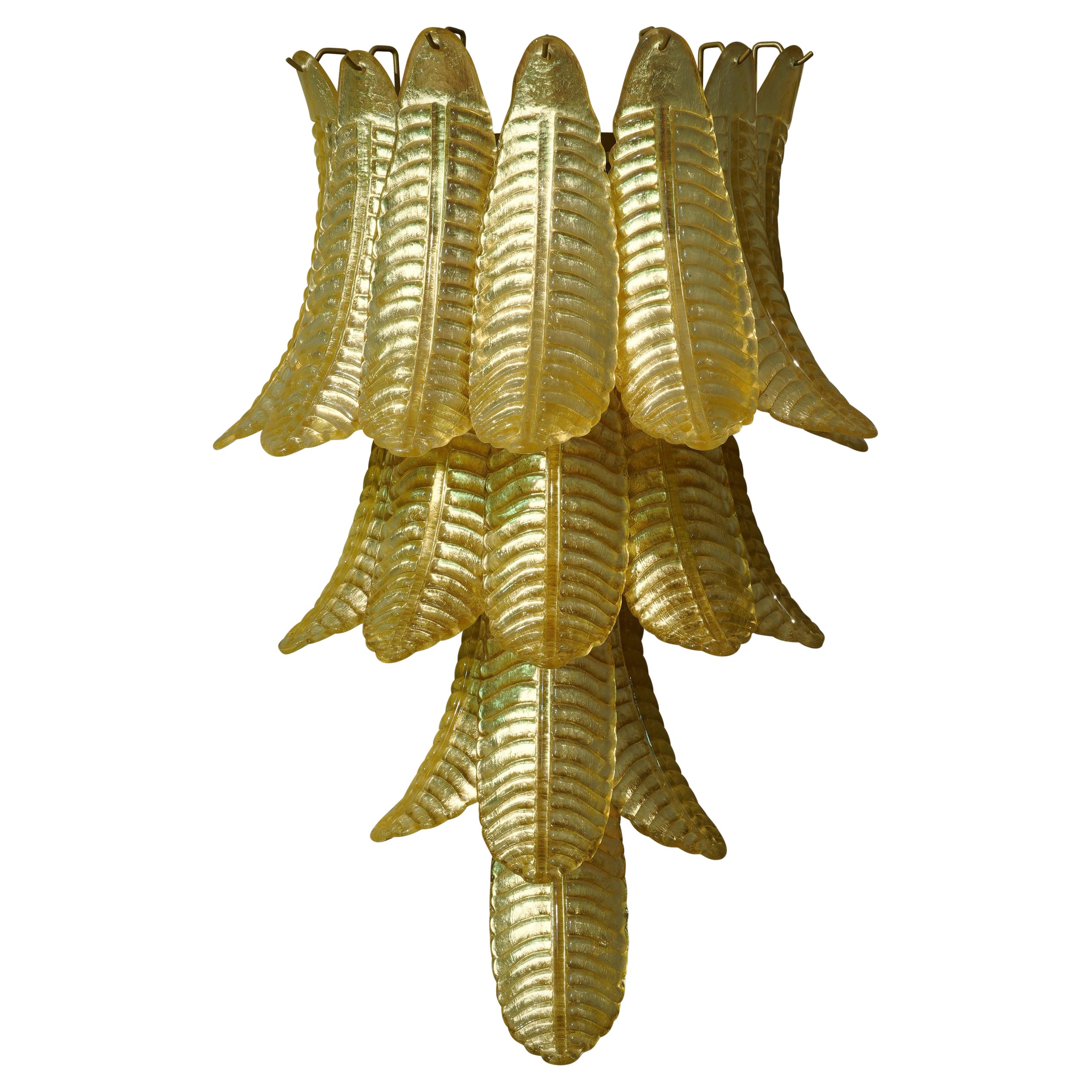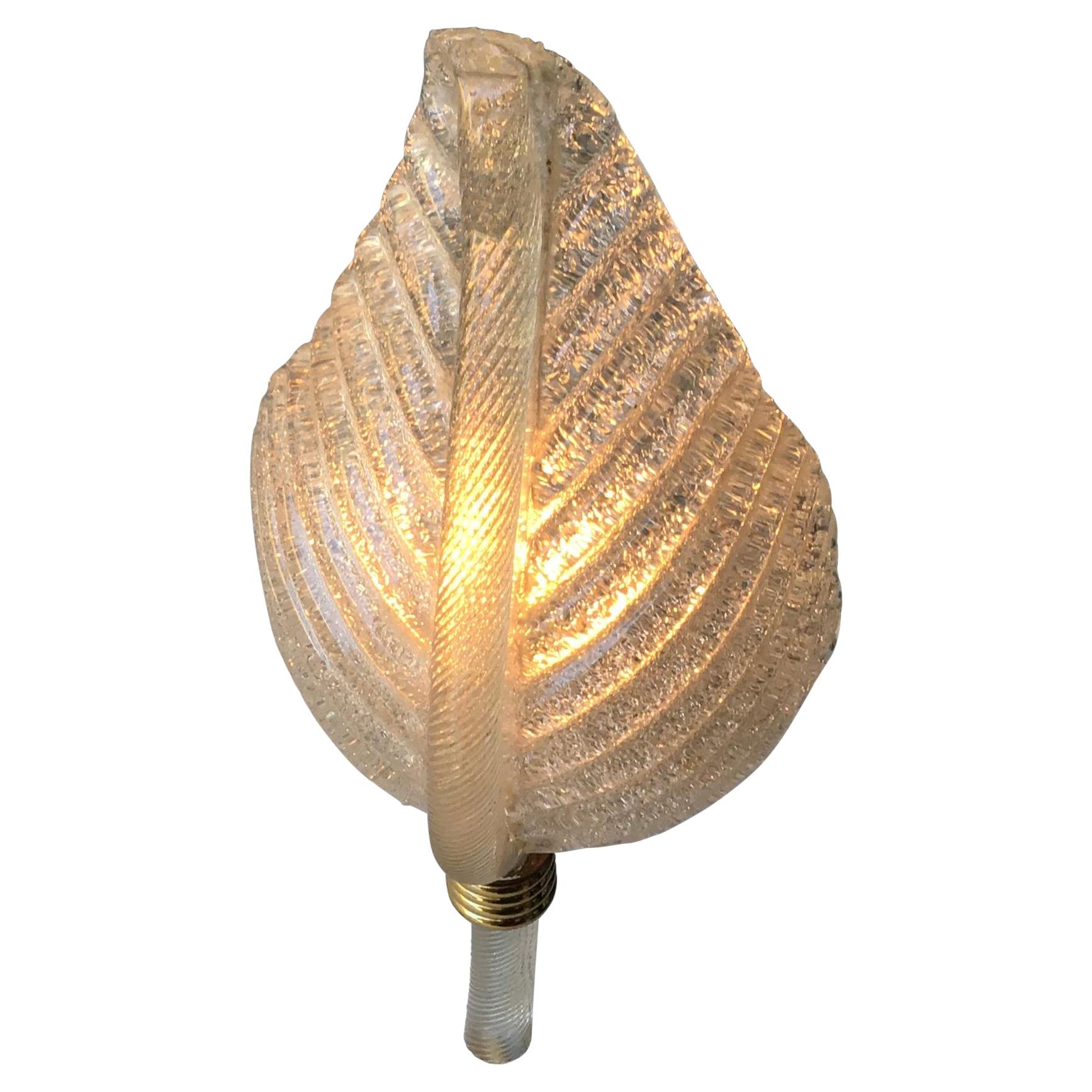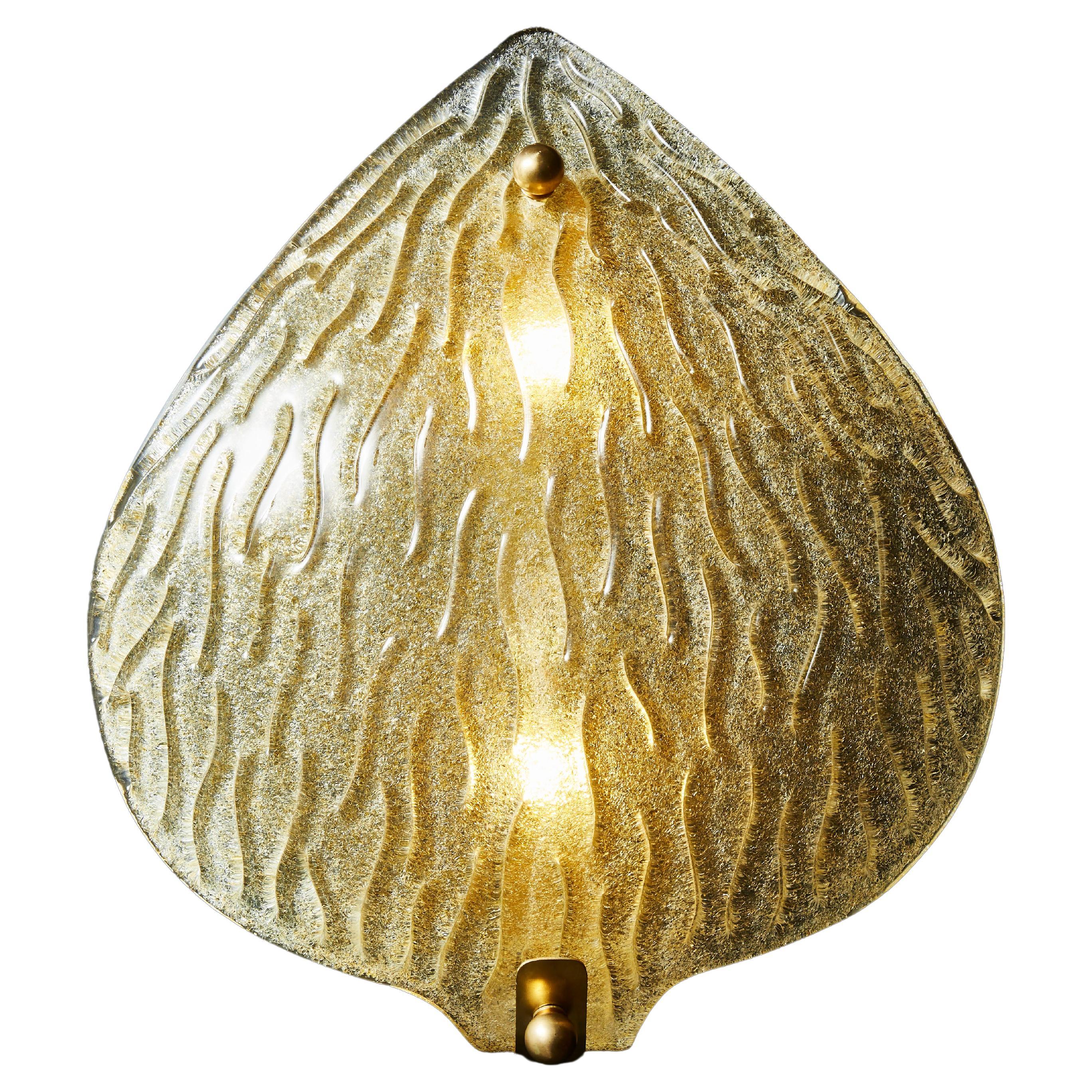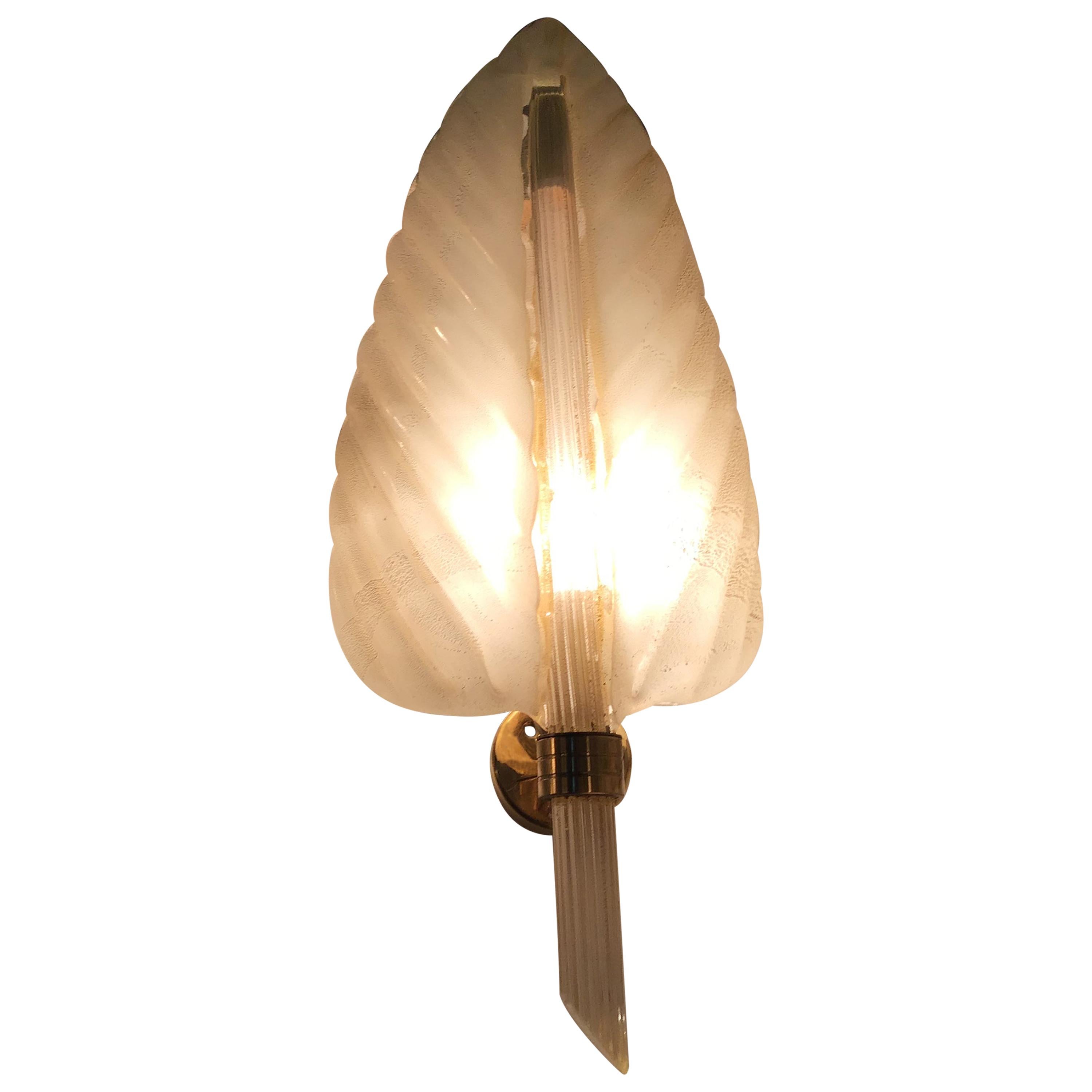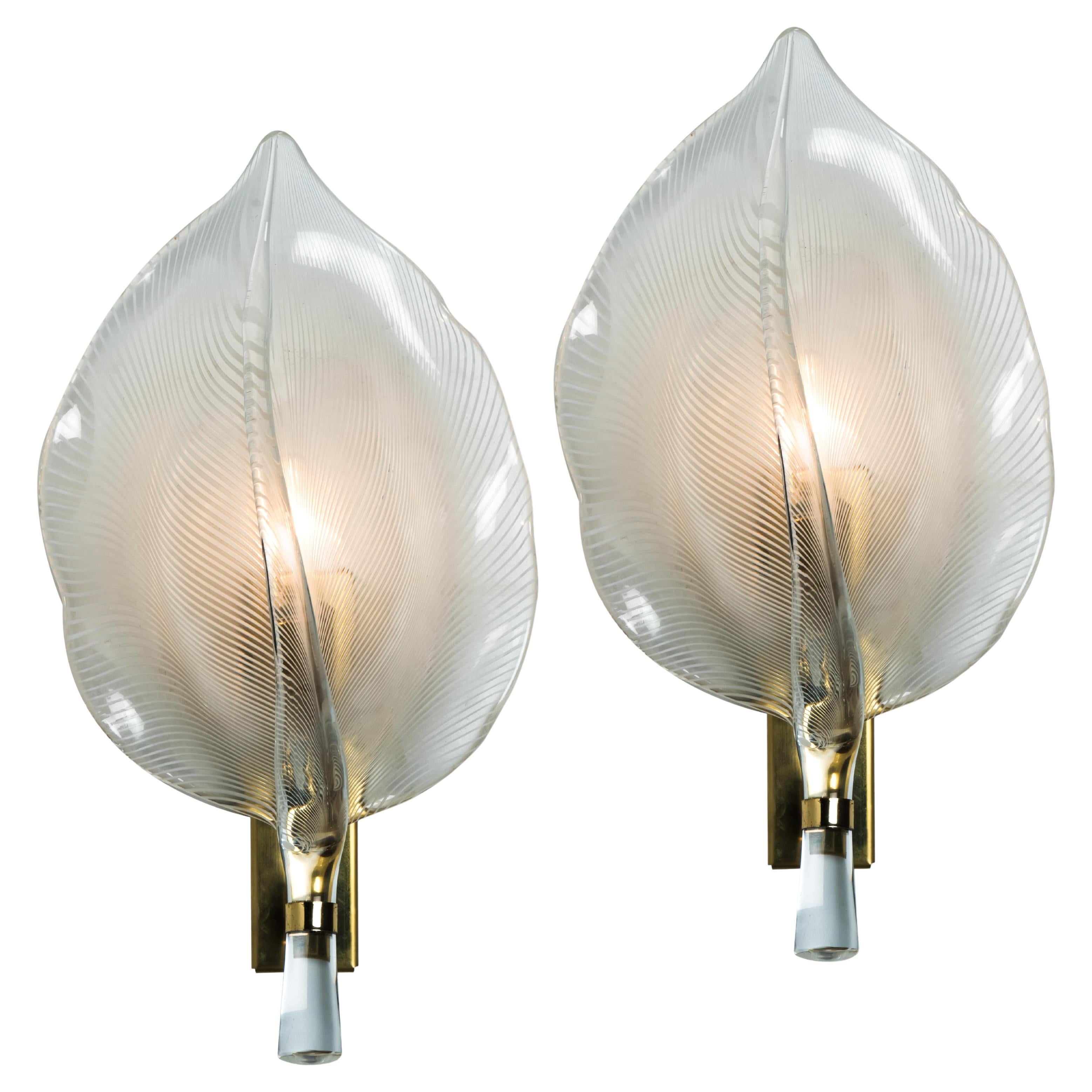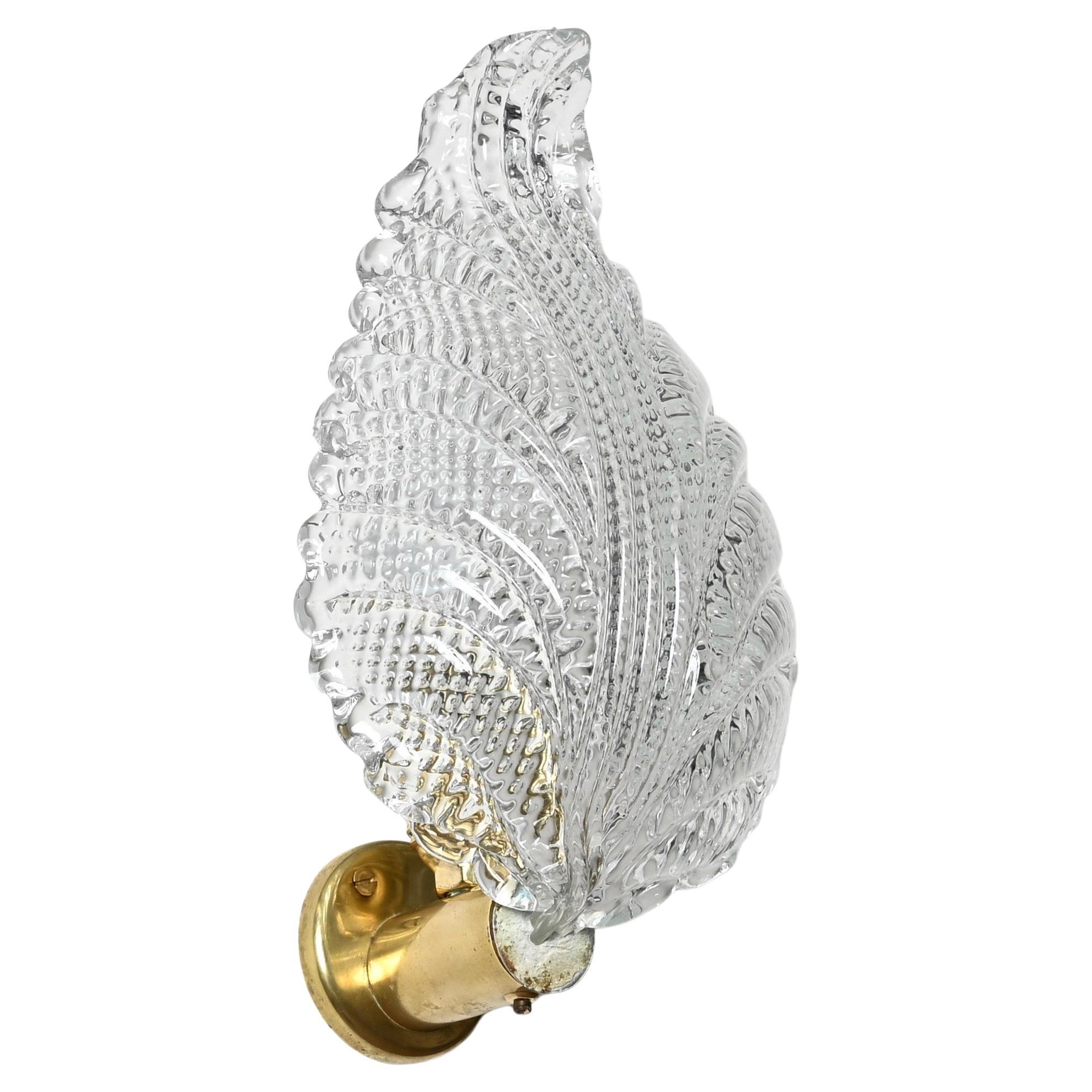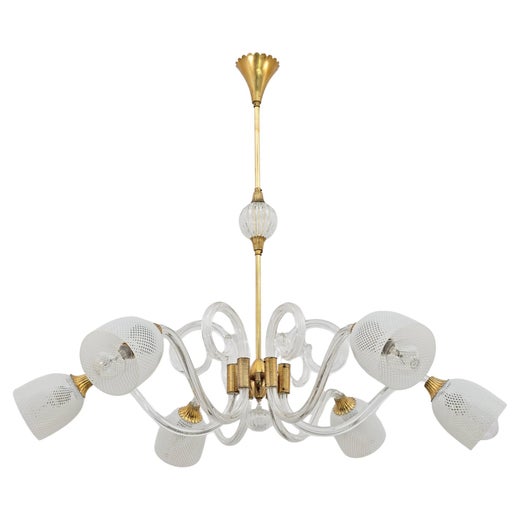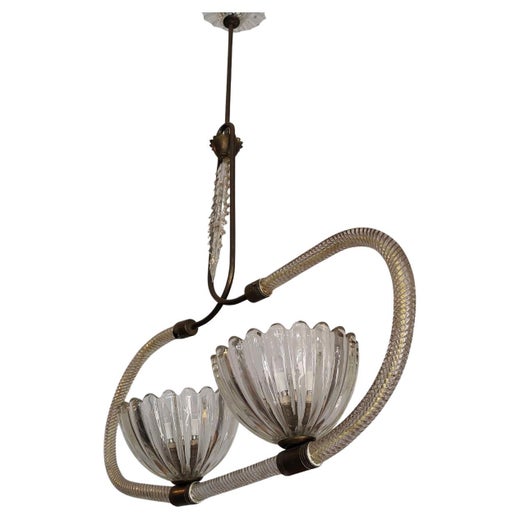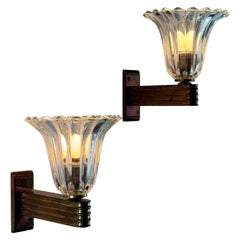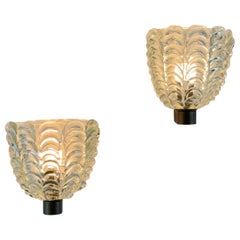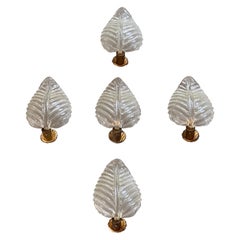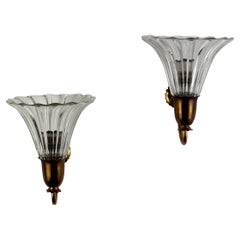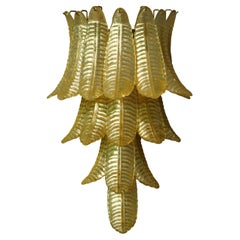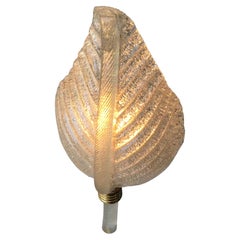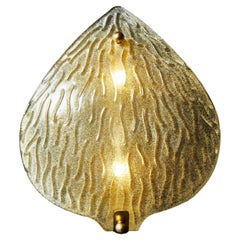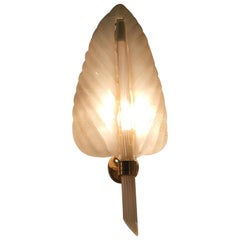Single Leaf Sconce in Pulegoso Glass with Gold Accents by Barovier & Toso, 1950s
About the Item
- Creator:Barovier&Toso (Manufacturer),Vetreria Artistica Barovier & C. (Designer)
- Dimensions:Height: 13.39 in (34 cm)Width: 6.7 in (17 cm)Depth: 5.52 in (14 cm)
- Power Source:Hardwired
- Voltage:220-240v
- Lampshade:Included
- Style:Mid-Century Modern (Of the Period)
- Materials and Techniques:
- Place of Origin:
- Period:
- Date of Manufacture:1950s
- Condition:Wear consistent with age and use.
- Seller Location:Bagnolo Mella, IT
- Reference Number:1stDibs: LU8256242022112
Vetreria Artistica Barovier & C.
The still-thriving glassworks known today as Barovier&Toso, revered for its catalogue of exquisite mouth-blown chandeliers, sconces and table lamps, originated on the Venetian island of Murano, a region of the world famed for its production of artisanal glassworks. In its early years, the firm traded under the name Vetreria Artistica Barovier & C.
The Barovier dynasty began in 1295, when Jacobello Barovier, mentioned in historical documents as a master glassblower, began pinching, cutting, blowing and twisting a molten mixture of sand and minerals into incandescent works of art. It remained entirely family-owned until the mid-20th century, when it merged with another glassworks to become Barovier&Toso.
Under the nearly 50-year artistic directorship of Barovier&Toso cofounder Ercole Barovier (1889–1974), the company created buoyant traditional pieces such as pendants and wall lights, and it pioneered an array of innovative modernist designs with bold colors, patterns and surfaces.
By the time Ercole Barovier was born, in 1889, his family had already been in the glassmaking business for centuries. Nonetheless, Ercole did not choose glassmaking as his first career — he instead studied medicine as a young man before going on to work as a radio operator in the first World War.
The year after the war ended, Ercole joined his family’s business (over time, in addition to Vetreria Artistica Barovier & C., the manufactory’s names have also included Fratelli Barovier and Artisti Barovier). Ercole was appointed artistic director in 1926, and subsequently managed the business with his brother Nicolò.
From 1927 onward, Ercole Barovier was the chief designer at his family’s glassworks. His style became defined by his use of riotous color and later, audacious forms. Ercole created sculptures, table lamps and other pieces using mosaic techniques to add a kaleidoscope of striking hues to his work. Early in his career, he garnered praise for his work with murrine glass, one of the traditional arts for which Murano is widely known. He became sole proprietor in 1934 and, in 1936, merged his own family business with the Venetian glass factory SAIAR Ferro Toso. They renamed the company Barovier&Toso, a name under which the firm still operates today.
To appeal to gentler, more conservative tastes, Barovier&Toso produced a range of lilting, sinuous lighting pieces that are often described as embodying “Liberty Style” — the Italian term for Art Nouveau, taken from the name of famed London department store Liberty & Co., which promoted 19th-century organic textile designs and Arts and Crafts-style furniture in the manner of William Morris. The hallmarks of the style in Barovier&Toso works are elements of glass in the shape of thick leaves, fronds and flower petals, deployed along with other naturalistic ornament in sconces, pendants and chandeliers.
Traditional or modern, Barovier&Toso has produced one of the finest and most diverse catalogues of Murano glass in the last 100 years.
Find antique Vetreria Artistica Barovier & C. lighting and decorative objects on 1stDibs.
Barovier&Toso
Partnerships come and go within the community of glass-making artisans on the Venetian island of Murano, where business relationships seem as complex as the shifting alliances in the notoriously acrimonious Italian parliament. Formed in 1942 by members of families with centuries of experience in the craft, Barovier&Toso has proven to be one of the most enduring and prosperous Italian glass manufactories of recent decades. Under the nearly 50-year artistic directorship of cofounder Ercole Barovier (1889–1974), the company created buoyant traditional pieces such as chandeliers, sconces and other lighting fixtures, and it pioneered an array of innovative modernist glass designs with bold colors, patterns and surfaces.
The Barovier dynasty began in 1295, when Jacobello Barovier, mentioned in historical documents as a master glassblower, began pinching, cutting, blowing and twisting a molten mixture of sand and minerals into incandescent works of art. It remained entirely family-owned until the mid-20th century, when it merged with another glassworks to become Barovier&Toso.
To appeal to gentler, more conservative tastes, Barovier&Toso produced a range of lilting, sinuous lighting pieces that are often described as embodying “Liberty Style” — the Italian term for Art Nouveau, taken from the name of famed London department store Liberty & Co., which promoted 19th-century organic textile designs and Arts and Crafts-style furniture in the manner of William Morris. The hallmarks of the style in Barovier&Toso works are elements of glass in the shape of thick leaves, fronds and flower petals, deployed along with other naturalistic ornament in sconces, pendants and chandeliers.
Ercole Barovier began his personal aesthetic transition toward modernism in the 1930s with his Primavera series of vases and animal sculptures — idiosyncratic milky-white and clear glass filled with tiny bubbles and hairline interior fissures that he produced for Artisti Barovier, a firm headed by his father and uncle. Later, with Barovier&Toso, he would explore such novel styles as the mosaic-like Pezzato glass; fluid Spiral patterns; the pebbly textured Barbarico line and the complex, layered and highly colored abstractions of the Oriente series of vases and bowls.
Traditional or modern, Barovier&Toso — still under family control — has produced one of the finest and most diverse catalogues of Murano glass in the last 100 years.
Find antique Barovier&Toso chandeliers, serveware, decorative objects and more on 1stDibs.
- ShippingRetrieving quote...Shipping from: Bagnolo Mella, Italy
- Return Policy
More From This Seller
View AllVintage 1940s Italian Art Deco Wall Lights and Sconces
Brass
Vintage 1930s Italian Mid-Century Modern Wall Lights and Sconces
Brass
Vintage 1940s Italian Mid-Century Modern Wall Lights and Sconces
Brass
Vintage 1930s Italian Mid-Century Modern Wall Lights and Sconces
Brass
Vintage 1950s Italian Mid-Century Modern Wall Lights and Sconces
Metal, Brass
Vintage 1960s Italian Mid-Century Modern Table Lamps
Glass, Art Glass, Murano Glass
You May Also Like
Vintage 1980s Italian Mid-Century Modern Wall Lights and Sconces
Art Glass, Murano Glass
Vintage 1940s Italian Other Wall Lights and Sconces
Murano Glass
Vintage 1980s Italian Mid-Century Modern Wall Lights and Sconces
Brass
Vintage 1940s Italian Other Wall Lights and Sconces
Murano Glass
Vintage 1970s Italian Mid-Century Modern Wall Lights and Sconces
Brass
Vintage 1950s Italian Mid-Century Modern Wall Lights and Sconces
Brass
